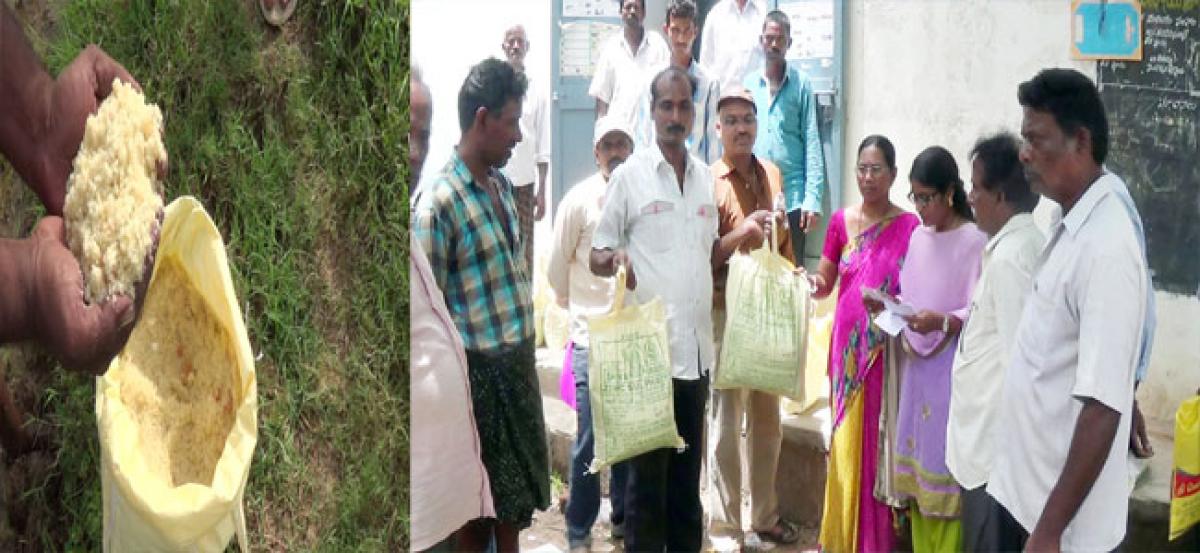Live
- Sisodia not to report to police twice a week: SC
- No possibility of alliance with Cong for Delhi polls: Kejriwal
- Marriage an integral part of life: Top court enhances compensation to road accident victim
- 8,31L farmers get skill training in AP
- CM: Bypass to be constructed to decongest traffic in Kurukshetra
- Harassed by police, leader commits suicide in Baran
- Sikh preacher Dhadrianwale booked for rape, murder
- AI-powered digital initiatives at RGIA
- Yogi’s efforts revive Nagvasuki Temple ahead of Maha Kumbh
- Delhi drowning deaths : HC seeks CBI reply over interim bail to coaching centre officials
Just In

Agriculture assistant director Padmasri said that the solution was in direct application of micronutrients like gypsum and boran.The soil test results have been submitted to the farmers. Application of phosphorous, potash and nitrogen would have no impact unless the problem of micronutrients is solved, she said adding that earlier the subsidy component was 50 per cent and presently it is 100 per c
Pithapuram: Agriculture department officials are emphasising on the significance of micronutrients in paddy crop and sensitising the farmers on how to overcome the deficiency of micro nutrients. Officials are supplying zinc, boran and gypsum on 100 per cent subsidy to supplement the presence of micronutrients in the crop.
Soil testing center at Samalkot here has identified that the drylandsin the mandal are suffering from micronutrients’ deficiency. Presently, farmers are wet-ploughing the land. Paddy transplantation has been completed only in 20 per cent of the total area under this crop. At this stage, the farmers have been advised to apply boran, zinc and gypsum.
Soil testing carried out by taking a sample for every 6.25 acres revealed that the sample was deficient in micronutrients. The deficiency ranges between 20 and 30 per cent. Due to this problem, there is no use in applying other fertilizers. The yield per acre would be less by at least two to four bags.
Agriculture assistant director Padmasri said that the solution was in direct application of micronutrients like gypsum and boran.The soil test results have been submitted to the farmers. Application of phosphorous, potash and nitrogen would have no impact unless the problem of micronutrients is solved, she said adding that earlier the subsidy component was 50 per cent and presently it is 100 per cent.
Already, 87 metric tonnes of zinc, gypsum and boran were distributed to farmers, she said.Agriculture department is providing 20 kg of zinc, 40 kg of boran and half kg of gypsum free of cost. The officials are sensitising farmers and supplying micronutrients depending on soil test results. Fertilizers will be effective only when micronutrient deficiency is rectified.
Micronutrients should not be applied along with the fertilizer. In fact, 30 per cent of the lands are suffering from zinc deficiency. In case of zinc deficiency, paddy leaves turn yellow and become hard. It would continue to remain weak even after applying fertilizer. Padmasri has been advising farmers to use fertilizers only after 24 hours after applying zinc.
Gypsum deficiency affects photosynthesis among plants. It would affect the formation of the grain. The yield will come down. To solve the problem, at least 40 kg of gypsum should be applied per acre. Boran deficiency is not that extensive. However, the officials are advocating application of half kg of boran per acre to derive good results.
Boran solution should be sprayed during the transplantation of paddy or after this process. Tenant farmers are also being supplied with the micronutrients. Quantities sufficient for five acres are being supplied to farmers. Padmasri advised farmers who have transplanted paddy to apply zinc sulphate twice a week at the rate of 2 kg per acre. Agriculture officer YV Gangadhara Kumar, Agriculture extension officer Prasanti and others took part in the zinc distribution programme.
By Saride Nageswara Rao

© 2024 Hyderabad Media House Limited/The Hans India. All rights reserved. Powered by hocalwire.com







